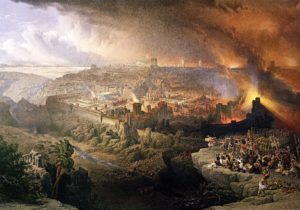Michael Doran’s very engaging piece on theology in American foreign policy presents a rather tidy narrative (perhaps overly tidy, as previous respondents have pointed out) on Jacksonianism and Progressivism, two poles of thinking about government and foreign policy that premillennial dispensationalism and progressive Protestantism shaped.
The article is mistakenly titled “The Theology of Foreign Policy.” Little theology is discussed till the very end, and only in brief snippets. Instead, the article explains how two theological dispositions, which do not address theology at all, animate legal and cultural disputes. A true theology of foreign policy would formulate theological categories or concepts that debates over foreign policy could use. Christians in the past, believe it or not, have actually attempted to do this. The two most prominent figures of this tradition, Augustine of Hippo in City of God and Thomas Aquinas in the Summa Theologiae, attempted to think about politics within a theological framework. Both have been extremely influential throughout Western history and can be seen in Reinhold Niebuhr and Jacques Maritain, two influential figures of the twentieth century.
Doran does illustrate how America is unique in the ways that it has approached foreign policy. Not only was America a nation “under God,” as most European nations would also readily confess of themselves, but it was a nation destined by God. As Walter McDougall recently points out in his provocative book The Tragedy of American Foreign Policy, America has dealt with politics and foreign policy by developing a civil religion that focused on the nation’s theological importance as special and divinely ordained by God for the preservation of liberty and self-rule. McDougall calls this “divine-right republicanism” because it does not worship the nation but rather worships the God who has brought about the new republic. In this way, Jacksonianism is a variant on the Founders’ divine-right republicanism.
Progressives all too often see this mindset as a backward, reactive jingoism since it is expressed in a rousing fashion and its champions tend to be common folk who deeply distrust elites. Yet the Jacksonian persuasion actually places a great restraint on America. While Progressives claim it is a fanatical nationalism, it is actually produced by a spirituality that sees the great and terrible God with His hand outstretched, sometimes in judgment and other times in blessing. Jacksonianism remains a vibrant tradition because God remains transcendent, unpredictable, and terrible in His wrath. The “Battle Hymn of the Republic” captures this image poignantly in its opening stanzas:
Mine eyes have seen the glory of the coming of the Lord;
He is trampling out the vintage where the grapes of wrath are stored;
He hath loosed the fateful lightning of His terrible swift sword;
His truth is marching on.
These verses do not present a secularized nationalism that merely assimilates God’s will for America’s national interest, and the hymn recognizes that God’s glory is not a repackaged version of the prosperity gospel. Instead, His glory is a terrible judgment under which America stands and a burden when His “terrible swift sword” has been loosed from its scabbard. It is worth noting that the original version of the Battle Hymn was “John Brown’s Body,” which praised the “martyr” John Brown for his prophetic and violent stance against slavery.
Of course, this judgment evokes a contemporary of the hymn, Lincoln’s deeply transcendent Second Inaugural with its imagery of divine punishment and propitiation for the sin of slavery. Biblical imagery saturates Lincoln’s meditation on the Lord’s great and terrible judgment:
If we shall suppose that American slavery is one of those offenses which, in the providence of God, must needs come, but which, having continued through His appointed time, He now wills to remove, and that He gives to both North and South this terrible war as the woe due to those by whom the offense came, shall we discern therein any departure from those divine attributes which the believers in a living God always ascribe to Him? Fondly do we hope, fervently do we pray, that this mighty scourge of war may speedily pass away. Yet, if God wills that it continue until all the wealth piled by the bondsman’s two hundred and fifty years of unrequited toil shall be sunk, and until every drop of blood drawn with the lash shall be paid by another drawn with the sword, as was said three thousand years ago, so still it must be said “the judgments of the Lord are true and righteous altogether.”
Lincoln’s God is not the God of human progress or enlightened rationalism. He is not the God of the social gospel memorably described by H. Richard Niebuhr as “a God without wrath [who] brought men without sin into a kingdom without judgment through the ministrations of a Christ without a cross.” It is a God of judgment that Jacksonianism, premillennialism, the Battle Hymn, and Lincoln’s inaugural invoke as the one who stands over America.
In contrast, the God of the Progressive persuasion is too often assimilated to the culture. He is not the God of judgment and mercy of the bible but a benign deity who has no need for the crude backwardness of wrath. This is not the God of the Hebrews but the God of Marcion and the heretics who found divine holiness and wrath in contradiction with divine love.
Very rarely do core religious convictions express themselves coherently in any clear and systematic pattern since any ideology must accommodate other factors in politics. But our core intuitions spring from deep wells, as Doran helpfully concludes, and inform our ideas about human nature, morality, society, government’s proper role, the United States’ mission, and the meaning of history. Those intuitions have been passed down through the generations, and they linger in the air of American discourse, though they are so near to us that we hardly notice.
Both the Jacksonian and Progressive political persuasions are heretical, as all political thought is bound to be. Neither can be the orthodox position because there is no such thing as an orthodox politics. The claim that America is a specially chosen nation, a city on a hill, or a light to the nations that God has commissioned as the defender of liberty is not a theologically defensible claim. While defending liberty is a worthwhile and noble mission, the liberty of the gospel is not the liberty of the American Republic, regardless of how glorious it is.
Christianity and the God it worships must always remain at some distance from its own political context. Believers should realize that the city of God is a pilgrim people traversing through history en route to a city where God shall be the known and enjoyed forever. All nations shall gather to worship at the throne of the Lamb who was slain. The Hebrew writer tells us, “For here we do not have an enduring city, but we are looking for the city that is to come” (13:14).
We ought not to forgo a sense of gratitude nor duty for the blessings and benefits that God’s providence has poured out on our nation. Far from it. But Christians should remember this: any political theology that treats its own people as a divinely chosen political community treads on heretical soil. Idolatry is not far away.
That said, the Jacksonian persuasion is preferable to the Progressive, even given the temptations. Politics should be done in light of a deep theological vision that reckons with the God under whom we find ourselves ruled. The danger of some heresies is preferable to others, and the delightful heresy of Jacksonianism remains receptive to the God whose mercy and judgment we find ourselves under.
—
Daniel Strand, a Providence contributing editor, is a postdoctoral fellow in the Center for Political Thought and Leadership at Arizona State University. His scholarly interests are in history of political thought, religion and politics, and the thought of St. Augustine of Hippo.
Photo Credit: Statue of Andrew Jackson. By Angie Garrett, via Flickr.







 Sponsor a student for Christianity & National Security 2024
Sponsor a student for Christianity & National Security 2024